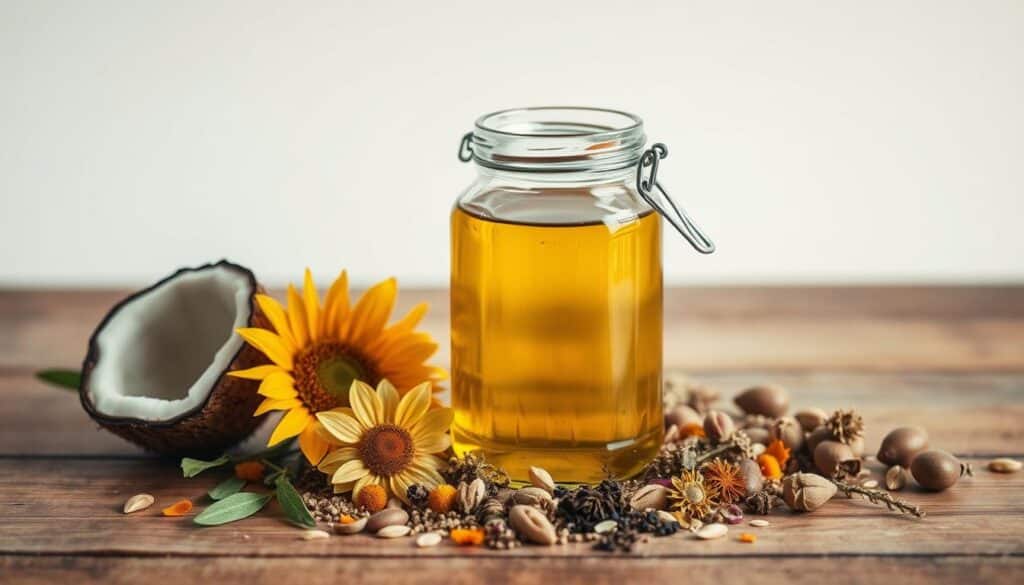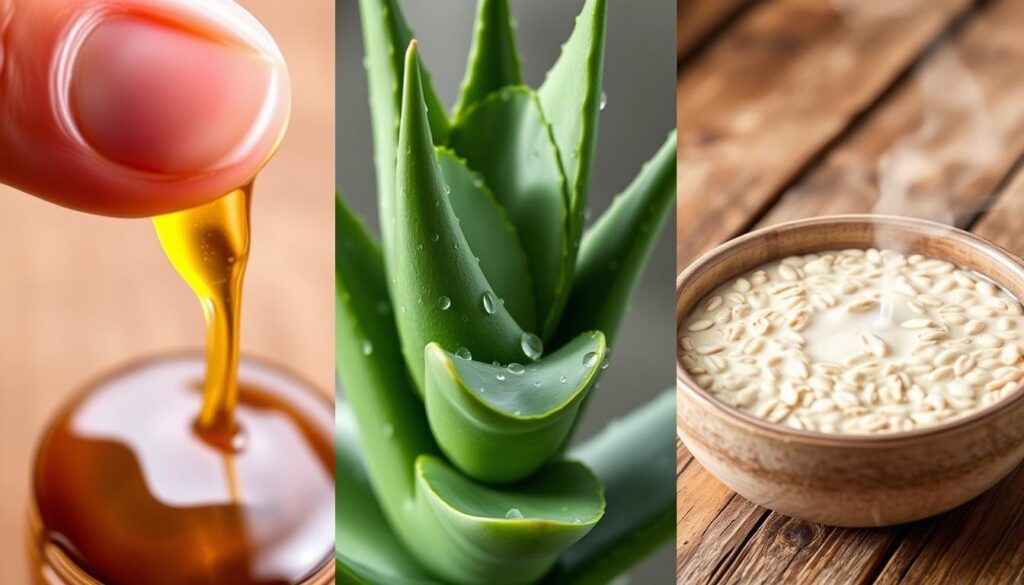Natural Remedies For Dry Skin Dealing with dry, flaky, and irritated skin can be tough. But, the answer might be in nature. This article looks at natural remedies that can make your skin feel better. You’ll learn how to use simple ingredients at home to make your skin healthy and glowing.
Key Takeaways
- Discover natural solutions to combat dry, flaky skin
- Learn about the benefits of nourishing oils, natural moisturizers, and dietary solutions
- Explore simple, at-home remedies to revive and hydrate your skin
- Understand the causes of dry skin and why natural remedies are effective
- Protect your skin with humidifiers, gloves, and by avoiding irritants
What Causes Dry Skin and Why Natural Remedies Matter
Dry skin, also known as xerosis, happens for many reasons that take away the skin’s moisture. Things like harsh weather, hot showers, dry air, and strong soaps can make skin dry. Luckily, natural remedies can fix the problems and make skin feel better.
Understanding Dry Skin Causes
The main reasons for dry skin are:
- Environmental factors, such as low humidity, cold temperatures, and wind exposure
- Excessive use of hot water and harsh cleansers that strip the skin of its natural oils
- Aging, which can reduce the skin’s ability to retain moisture
- Certain medical conditions, like thyroid disorders and diabetes, that can contribute to dry skin
- Medications, such as diuretics and retinoids, that can deplete the skin’s moisture
Benefits of Natural Remedies for Dry Skin
Natural remedies for dry skin use ingredients that help the skin’s barrier, reduce swelling, and add moisture without harsh chemicals. These home treatments offer many benefits:
- Improved Skin Barrier Function: Natural oils and emollients help seal in moisture and protect the skin from environmental stressors.
- Reduced Inflammation: Soothing ingredients, like aloe vera and oatmeal, can calm irritation and redness.
- Enhanced Hydration: Humectants, such as honey and glycerin, draw moisture into the skin and prevent evaporation.
By fixing the dry skin causes and giving the skin gentle, nourishing care, natural remedies can make the skin healthy and glowing.
Nourishing Oils: Coconut, Sunflower, and Olive

Some natural oils can be great for dry skin. Coconut oil is an excellent choice because it fills in the gaps between skin cells. This gives your skin deep hydration that lasts a long time. However, olive oil might not be the best choice on its own because it can harm the skin’s protective layer.
Sunflower seed oil is great for keeping skin hydrated. Adding these oils to your skincare routine can make your skin soft, supple, and healthier-looking.
| Oil | Benefits for Dry Skin |
|---|---|
| Coconut Oil | Emollient, helps fill spaces between skin cells, provides deep hydration |
| Sunflower Seed Oil | Improves skin hydration |
| Olive Oil | May damage skin’s protective barrier when used alone |
Using coconut oil for dry skin, sunflower seed oil for dry skin, and olive oil for dry skin can make your skin healthier and more radiant. These natural oils are great for dry skin.
Natural Moisturizers: Honey, Aloe Vera, and Oatmeal

Looking for a way to treat dry skin? Honey, aloe vera, and oatmeal are great options. They can help soothe and moisturize your skin.
Honey’s Antimicrobial and Healing Properties
Honey is known for its healing powers. It’s great for dry, irritated skin. Its moisture-locking properties and antibacterial effects can reduce redness and inflammation.
Using honey for dry skin can make a big difference. You can put it on your face or use it in a mask.
Soothing Oatmeal Baths and Masks
Oatmeal is also a great choice for dry skin. Oatmeal baths and masks can calm itchiness and reduce redness. They also help remove dead skin cells, making your skin look better.
And don’t forget about aloe vera. This gel is great for keeping moisture in and reducing inflammation. It’s perfect for dry, irritated skin.
Adding these natural moisturizers to your skincare routine can help you say goodbye to dry skin. Hello to a healthy, hydrated complexion!
Natural Remedies For Dry Skin

Dietary Solutions: Antioxidants and Omega-3s
Not just creams and lotions, what you eat can also make your skin healthier. Foods packed with antioxidants like blueberries, tomatoes, and beans fight off damage from the environment. They also help your skin heal itself. Omega-3 fatty acids in salmon can make your skin look and work better too.
Eating a mix of natural dry skin remedies and dietary solutions for dry skin can really help. By eating foods full of antioxidants for dry skin and omega-3s for dry skin, you feed and shield your skin. This leads to skin that looks better and feels more hydrated.
| Antioxidant-Rich Foods | Omega-3 Rich Foods |
|---|---|
| Blueberries | Salmon |
| Tomatoes | Walnuts |
| Beans | Chia seeds |
| Spinach | Flaxseeds |
Adding these natural dry skin remedies to your meals can really help. They target the main causes of dry skin and give your skin the nutrients it needs to be healthy.
“Nourishing your skin from the inside out is just as important as using topical treatments.”
Protecting Your Skin: Humidifiers, Gloves, and Avoiding Irritants

Keeping your skin hydrated is more than just about moisturizing. You must also think about the things around you and your daily habits. Using humidifiers, wearing protective gloves, and avoiding irritants can help your skin stay healthy.
Humidifiers for Dry Skin
Heating your home can dry out the air, taking moisture from your skin. A quality humidifier can fix this by adding moisture back. Keep the humidity level between 30-50% for best results.
Gloves to the Rescue
When you do household chores or are out in the cold, wearing protective gloves helps your dry skin. These gloves protect your hands from irritants and harsh chemicals. They let your skin keep its natural oils, staying soft and supple.
Identifying and Avoiding Irritants
Some products and materials can make dry skin worse. Be careful with harsh soaps, chlorinated water, and certain fabrics. Choose gentle, fragrance-free options and wear breathable, natural fibers to keep your skin happy.
Adding these protective steps to your daily life can help keep your dry skin safe. This way, you give your skin the care it needs to stay healthy.
Also Read: Affordable Skincare Routine For Beginners – Simple Steps
Conclusion
Using natural remedies can help soothe and hydrate dry skin. Simple treatments like nourishing oils and dietary changes can balance your skin’s moisture. This can prevent further irritation or damage.
Natural remedies can make your skin healthier and more radiant. For example, coconut oil’s hydrating properties and honey’s antimicrobial benefits are great for dry skin. These options offer a gentle way to address dry skin issues.
Combining these natural solutions can give you lasting relief. With a few simple changes in your daily routine, you can say goodbye to dry skin. This leads to a healthier, glowing complexion and boosts your confidence.
FAQs
Q: What are some effective home remedies for dry skin?
A: Some effective home remedies for dry skin include using coconut oil, aloe vera, honey, and oatmeal. These ingredients help to moisturize dry skin and improve skin health.
Q: How can I prevent dry skin during the winter months?
A: To prevent dry skin in winter, it’s important to keep your home humidified, take shorter showers, and apply a thick moisturizer immediately after patting your skin dry.
Q: What symptoms of dry skin should I look out for?
A: Symptoms of dry skin include tightness, flakiness, redness, itching, and the appearance of dry patches. If these symptoms persist, it may be a sign of an underlying skin condition.
Q: Can home remedies really help soothe dry skin effectively?
A: Yes, many home remedies can effectively soothe dry skin. Ingredients such as olive oil and shea butter are known for their excellent natural moisturizing properties.
Q: Are there any DIY at home remedies that can heal dry skin?
A: Yes, you can try DIY remedies such as mixing honey with yogurt to create a moisturizing mask or using a blend of avocado and olive oil to help treat dry skin.
Q: How do I know if my skin type is prone to extremely dry skin?
A: If you frequently experience tightness, itchiness, or visibly flaky patches, your skin may be classified as extremely dry. Monitoring your skin’s reaction to various products can also help determine your skin type.
Q: What should I use to moisturize dry skin effectively?
A: Look for moisturizers that contain hyaluronic acid, glycerin, or ceramides. These ingredients help to hydrate and lock in moisture, making them excellent for moisturizing dry skin.
Q: Can petroleum jelly help relieve dry skin?
A: Yes, petroleum jelly is found to significantly improve skin elasticity and firmness. It serves as a barrier that locks in moisture, making it an excellent option for treating dry patches.
Q: How can I incorporate remedies you can DIY into my skin care routine?
A: You can incorporate DIY remedies by setting aside time each week to apply masks or treatments using natural ingredients. Consistency will help improve your skin’s overall health and appearance.
Q: What is the best way to pat your skin dry after washing?
A: The best way to pat your skin dry is to use a soft towel and gently press it against your skin, avoiding any harsh rubbing. This method helps maintain your skin’s natural moisture balance.
Source Links
- https://www.medicalnewstoday.com/articles/319555
- https://www.healthline.com/health/home-remedies-for-dry-skin
- https://www.everydayhealth.com/skin-and-beauty/natural-skin-remedies.aspx




